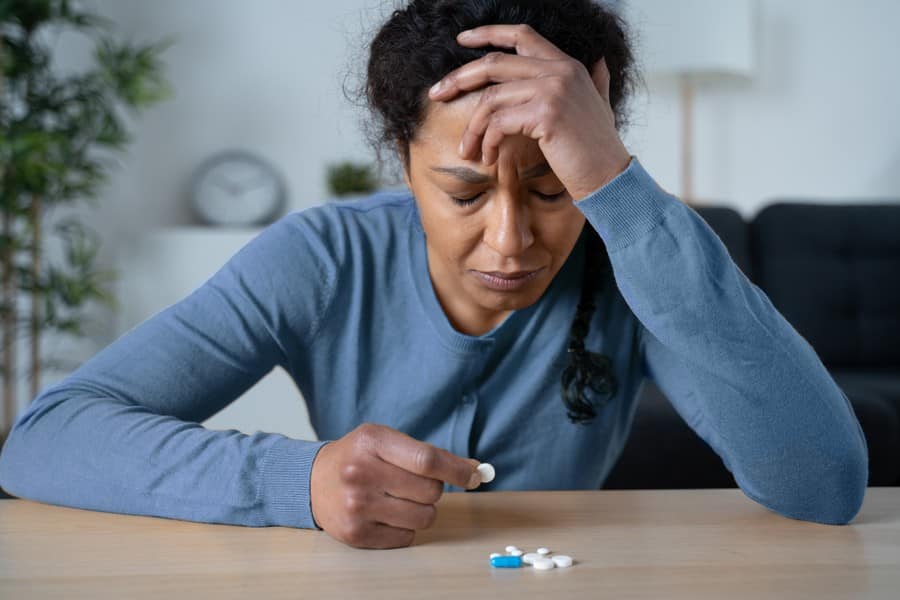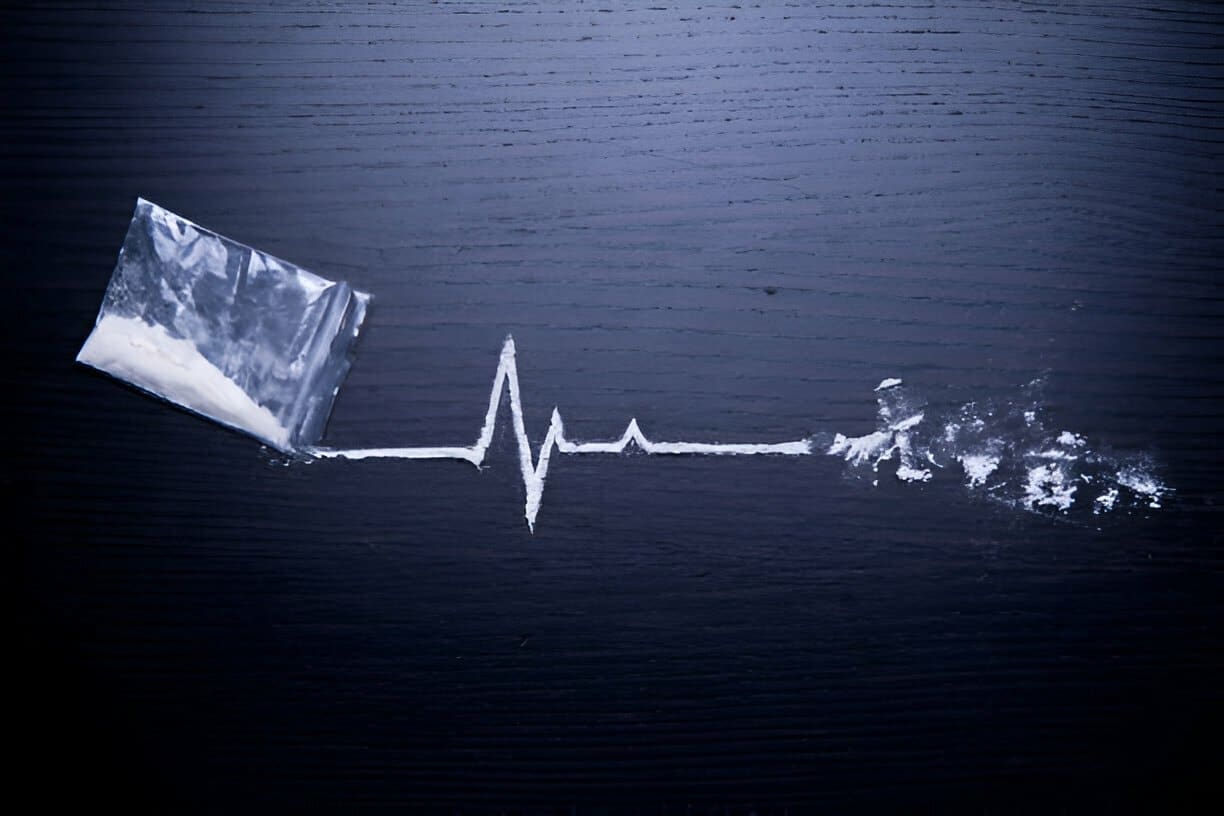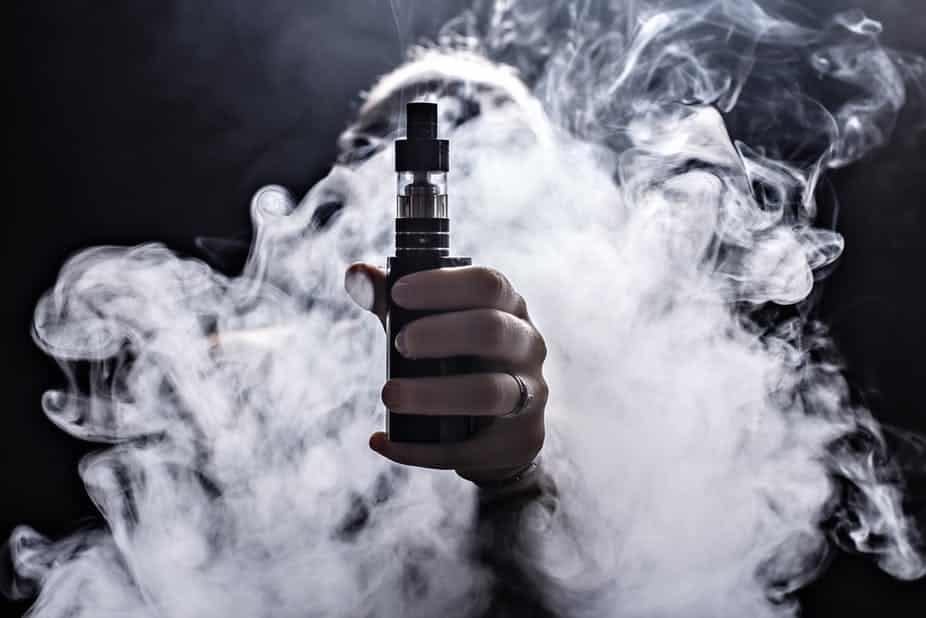Chlordiazepoxide is a benzodiazepine medication used to treat insomnia, anxiety, and drug/alcohol withdrawal symptoms. It is available in tablet form.

It acts on the central nervous system and has anticonvulsant, anxiolytic, amnesic, sedative, hypnotic, and skeletal muscle relaxant characteristics with a medium to long half-life. Illegally obtained chlordiazepoxide is sold under street names such as downers, tranqs, bennies, benzos, nerve pills, etc.
Due to the drug’s extremely addictive potential and to prevent its abuse, Librium is classed as a Class C restricted substance in the United Kingdom.
Librium is the most common brand name for chlordiazepoxide. However, other brand names for chlordiazepoxide include Mitran, Poxi, Libritabs, Limbitrol, Limbitrol DS, Librax, Clindex, and Chlordinium.
If your loved one needs support dealing with an Alcohol Addiction, contact us today on 0800 999 1083. We can help you by recommending treatment options.
Chlordiazepoxide’s active mechanism is its capacity to affect particular brain receptors known as GABA receptors. The medicine stimulates the release of the GABA neurotransmitter, which makes you feel calm and relaxed. It is a neurotransmitter that aids in the regulation of brain activity and is also involved in the induction of relaxation and sleep.
Patients who take chlordiazepoxide for substance addiction treatment risk becoming addicted if their brains can no longer create enough GABA without the drug’s support. Because of this action method, the brain believes it requires chlordiazepoxide to function effectively.
Addiction, a widely misunderstood term, is a condition of the brain’s reward system in which continuous involvement in specific behaviours (in this case, chlordiazepoxide use) leads to a compulsion to repeat those behaviours despite any negative consequences. Addiction is commonly confused with (and linked to) dependence, with long-term use of chlordiazepoxide raising the risk of both addiction and dependence.
Because Librium is commonly prescribed for the treatment of insomnia and anxiety disorders, people who take it may abuse it to enhance the benefits and, as a result, get addicted.
Professionals who work in high-stress environments are more likely to abuse Librium, as they frequently experience work-related anxiety, insomnia, or physical stress. In reality, everybody who is administered Librium runs the danger of abusing it and getting addicted, which is why it is only used in the most severe cases or when no other treatment options are available.
Other elements that may contribute to Librium addiction are:
The development of addiction to medications like benzodiazepines is thought to be influenced by your genetic makeup. If you have a family history of benzodiazepine abuse or another type of addiction, you run a substantially increased risk of developing drug dependency while using Librium.
Environmental considerations are also essential factors for developing an addiction. According to research, individuals who live in an environment where they have easier access to benzodiazepines or who are regularly surrounded by people who have an addiction are more likely to engage in similar behaviours.
Chlordiazepoxide is extremely addictive. It only takes a few weeks for some people to develop tolerance to the drug, which is true among all benzodiazepines. As a result, treatment experts advise avoiding giving the medicine for more than six weeks to recovering addicts.
A person addicted to chlordiazepoxide, like an alcoholic, must seek professional help. This is why doctors are incredibly cautious when it comes to administering the medicine throughout the detox process.
The biggest reason people abuse Librium is that it makes them feel very calm. Some people who suffer from anxiety problems or insomnia abuse Librium for its relaxing benefits.
Librium can induce a “high” akin to alcohol intoxication when taken in big dosages.
Abuse of Librium is defined as taking higher and more frequent doses than authorised – often three times the prescribed quantity. Substance abuse includes using the medicine without a prescription. Recreational users use Librium to achieve a high, and they frequently obtain the medicine on the street, online, or through doctor shopping. Librium users who use it recreationally take far bigger doses than doctors generally give.
Because Librium is less potent than most Benzos, it is frequently used in conjunction with other drugs to enhance its effects, despite the great danger of blacking out and the possibility of catastrophic respiratory collapse as a result of this behaviour. It’s also used to counteract the effects of stronger narcotics like cocaine.
A user may exhibit the following symptoms when developing a Librium addiction:
Other signs of chlordiazepoxide abuse may also include:
Benzodiazepine withdrawal is often regarded as one of the most unpleasant and harmful types of withdrawal syndrome. However, everybody who has developed a chlordiazepoxide dependence will have to go through withdrawal at some point.

On the plus side, medical assistance can alleviate many of the most distressing aspects of chlordiazepoxide withdrawal.
The following are some of the most common symptoms of chlordiazepoxide withdrawal:
The degree of common adverse effects varies. They include sleepiness, muscle weakness, light-headedness, dizziness, confusion, transient memory loss, and aggressive feelings. Although less common, more serious side effects such as headache, vertigo, vision abnormalities, diarrhoea, nausea and vomiting, and low blood pressure are possible.
Polydrug use refers to the use of numerous drugs at the same time. 80% of benzodiazepine addiction is thought to be part of a larger polydrug misuse cycle. Chlordiazepoxide is frequently mixed with other substances such as alcohol, opioids, and cocaine. Users frequently combine Librium with alcohol once tolerance has developed and the drug’s effects are no longer as powerful. When alcohol and Chlordiazepoxide are combined, both medications’ depressing effects are amplified, resulting in profound drowsiness and lethargy. Because benzodiazepines enhance the euphoric effects of opioids like heroin, they are also frequently combined with them. People who mix Librium and Cocaine will occasionally employ the former to counteract the latter’s effects.
Addicts and abusers of Chlordiazepoxide are more prone to develop adverse side effects like respiratory depression, blackouts, and excessive drowsiness if they combine Chlordiazepoxide with other drugs. When you use Librium with other substances, you run the risk of overdosing, which can be fatal.
Combining Chlordiazepoxide with other medications is risky because it raises the chance of overdosing. Librium overdose symptoms include:
Librium overdose can be lethal. If you are concerned that someone else or yourself is experiencing an overdose, seek medical help right away
Chlordiazepoxide is commonly used in dual diagnosis (when substance abuse disorders occur alongside other mental disorders) because of its function in treating certain mental health conditions. Addiction treatment is frequently complicated by dual diagnosis, requiring the use of specialised knowledge.
Self-medicating or combining anxiety medicines with other substances is common among people with co-occurring disorders. Post-traumatic stress disorder, anxiety, severe depressive disorder, and sleeping difficulties are common among those who abuse the medication.
Because of their relative accessibility and low cost, benzodiazepines are commonly abused by young people. If you suspect a young person you know is misusing chlordiazepoxide, contact an addiction professional immediately for professional treatment advice.
It’s heartbreaking to see someone you care about struggle with an addiction of any kind, and it’s normal that you’d want to step in right away. However, doing so may aggravate the situation and cause you to become estranged from your loved one. Contact an addiction specialist to discuss your issue and receive guidance on how to proceed. Above all, put your own and others’ safety first.
There are currently numerous centres treating chlordiazepoxide addiction around the country. Addiction treatment is typically divided into detoxification/withdrawal and therapy.
Professional treatment facilities will significantly reduce the severity of physical dependence symptoms while also providing mental support during the process.
For the length of your withdrawal symptoms, you will be continuously watched by addiction specialists in such a facility. Professional treatment will significantly reduce the severity of physical symptoms while also providing mental support during the process.
Gradually reducing your Chlordiazepoxide dosage while monitoring withdrawal symptoms is part of a medically assisted detox. This will be done in a secure and controlled setting, free of the triggers and pressures that often contribute to drug abuse. During treatment, any underlying diseases or co-occurring disorders will be addressed.
To aid your recovery, the following resources are also available:
All of the above can be paired with cognitive and behavioural therapy to guarantee complete recovery.
It’s important to remember that detox is only the first step on the road to recovery. Following detox, you’ll need to continue therapy (either in an inpatient or outpatient setting) to develop the coping skills you’ll need to maintain abstinence after treatment.
Treatment for Chlordiazepoxide addiction can be received through an inpatient or residential programme for more extreme cases, or through partial hospitalisation and various outpatient treatment programmes for less serious cases, depending on the severity of your addiction.
Don’t go through the process of recovery alone. Treatment providers can answer your questions. Get in touch with one today.
Call 0800 999 1083 today!
Different treatment facilities may offer different detoxification processes, and one patient’s experience may differ from another’s. For example, some patients may be required to taper down their chlordiazepoxide intake before beginning detox. Others may be prescribed specific medications, while some may not. If you’re considering chlordiazepoxide detox, acquire as much information as possible from your doctor, so you know what to expect.
Because of the dangers of benzodiazepine detox, you must be completely honest with your doctors, including any rehab facility staff, about your medical history, physical condition, and the severity and duration of your chlordiazepoxide abuse to avoid any dangerous complications during your treatment.

Quitting chlordiazepoxide is not only tough, but it can also be deadly if you don’t get proper support. When people abuse Librium for a long time, their neural connections shift as their brain becomes accustomed to the drug’s continual presence. To feel normal and perform correctly, the person becomes physiologically dependent on Librium. If you stop using Librium suddenly after acquiring a dependency, you’ll experience unpleasant withdrawal symptoms. Withdrawal can occur after just six to eight weeks of taking the suggested dosage of Librium. Withdrawal can be an extremely unpleasant experience best handled by a medical professional. Unfortunately, some of the chlordiazepoxide’s withdrawal symptoms can be severe or even fatal.
Therapy is at the centre of the treatment of chlordiazepoxide addiction, as it is with all addiction treatment. Only treatment can expose and address the psychological origins of any patient’s addiction, and detoxing and withdrawing without addressing these more underlying issues is likely to be ineffective in the long run, as the individual in question relapses into substance abuse and addiction. Addiction treatment is available in a range of formats and approaches and in one-on-one and group settings.
Quitting Librium is one thing, but staying off the drug for an extended period is an entirely different journey. You can benefit from the following support and aftercare to achieve long-term abstinence:
You’ll receive treatment from an addiction specialist during counselling, who will talk to you about your situation and assist you in identifying the root cause of your substance misuse. You’ll also learn how to avoid the stressors and triggers that lead you to misuse chlordiazepoxide in the first place, as well as healthy techniques to cope with the outside world without resorting to drug abuse.
This is a highly effective type of drug rehabilitation that uses group therapy to provide assistance and support. You’ll be in meetings with individuals who are going through the same thing as you, and you’ll be able to support and encourage one another to stay focused and dedicated to abstinence. Such support organisations include Narcotics Anonymous and 12-step programmes.
Any recovering addict’s family is a vital source of support. It’s critical that your family and loved ones have some essential training on how to properly assist and help you remain Librium abuse-free in order for them to be able to help you stay clean in the long run.
Relapse prevention is a lifelong process: while avoiding relapse is essential to treatment, relapsing does not indicate you have entirely failed in your recovery and will surely return to your addiction. Therapy, including the kind provided in treatment, can provide psychological defence systems and relapse prevention strategies. Participating in self-help groups and receiving counselling might be beneficial throughout your rehabilitation. Consult an addiction specialist to learn about effective relapse prevention methods.

BACP accredited psychotherapist with 16 years experience working in mental health specialising in psychodynamic person-centred therapies treating those with a range of mental health disorders including anxiety, depression, OCD and Addiction.

Fill in your details and we’ll send you a message via SMS.

No matter where you live, there are drug and alcohol rehab options for you to discover. Treatment providers are waiting to answer your questions. Get started today.

Ever felt that gnawing ache or burning sensation in your gut after a night of drinks? You’re not alone. Stomach pain after drinking is a common complaint, and there are a few reasons why it might happen. Let’s delve into the science behind the discomfort and explore ways to soothe your stomach. The Irritating Truth: … Continued

Cocaine, a stimulant known for its short-lived burst of energy and euphoria, hides a dark side. Behind the initial high lies a dangerous potential for overdose, with severe health consequences and even death. This article delves into the world of cocaine overdose, equipping you with the knowledge to recognize the signs, understand the dangers, and … Continued

Adult smoking habits in the UK refer to how often and in what ways people aged 18 and above use tobacco. This includes everything from smoking cigarettes every day to occasionally lighting up, as well as using other tobacco products. Understanding these habits is important for several reasons: Public Health: Smoking causes many diseases that … Continued

Addiction in the UK is a complex issue that is connected to various aspects of society such as healthcare and law enforcement. It affects people from all backgrounds and has negative impacts on families, communities, and the entire nation. Understanding addiction involves not only looking at the uncontrollable use of substances and repetitive behaviors but … Continued

Don’t go through the process of recovery alone. Treatment providers can answer your questions. Get in touch with one today.
Call 0800 999 1083 today!








